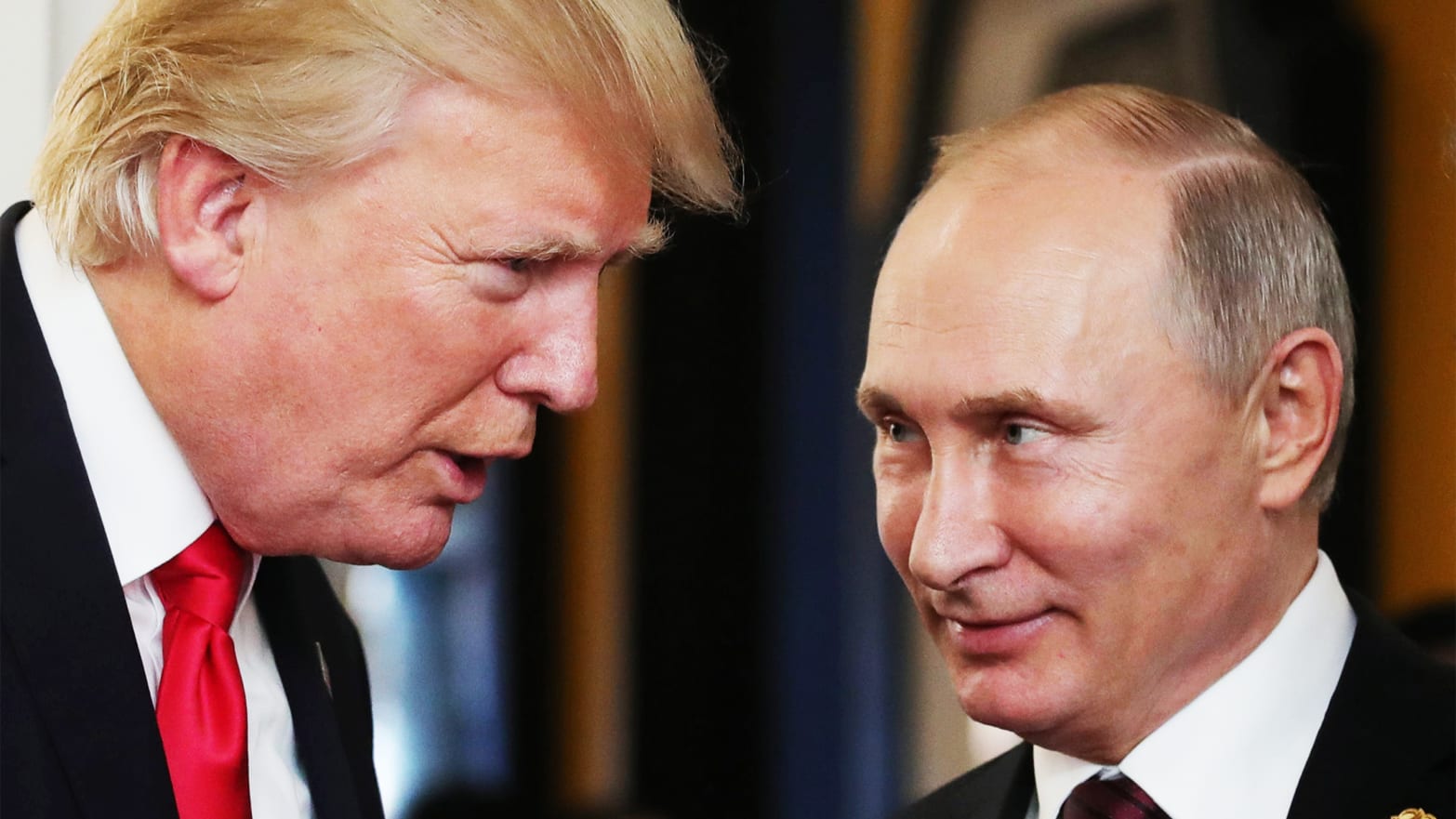Over the past several years, President Donald Trump has adamantly insisted that the Russian government did not hack his 2016 political opponents.
He’s blamed just about everybody but the Kremlin, speculated that the Democrats hacked themselves, and even suggested that Russian President Vladimir Putin was framed. He’s also said it would be all but impossible to ever know for sure who was responsible for the series of hacks that rocked the 2016 contest. Other Trump boosters – including former Breitbart reporter Lee Stranahan, who the indictment alludes to, and Trump ally Roger Stone – have also made similar arguments. The indictment appears to allude to both men.
Today, special counsel Robert Mueller largely put those conspiracy theories to bed, indicting a dozen Russian intelligence officers for the hacks.
The revelations come just days before Trump is set to have a one-on-one meeting with Russian President Vladimir Putin in Helsinki, Finland. It puts more pressure than ever on Trump to push back against Putin’s stubborn lie: that his country had nothing to do with the 2016 election meddling.
According to White House Press Secretary Sarah Huckabee Sanders, the Putin-Trump meeting is still on the books. The official White House statement on the new indictments, courtesy of a deputy press secretary, exculpated members of the Trump campaign while emphasizing that the news was "consistent with what we have been saying all along.”
In his presser on Friday announcing Mueller's new charges, Deputy Attorney General Rod Rosenstein mentioned he had briefed Trump days earlier about what was coming. Rosenstein declined to elaborate when asked about the tenor of his conversation with a president who has repeatedly mocked and flirted with firing him.
Five people, in and out of the administration, who regularly speak to Trump told the Daily Beast that they had not heard him raise any alarm or outrage over the Russian president or Russian hackers in recent days. Two of those people noted that Trump has, however, talked repeatedly about his upcoming meeting with Putin and complained about both Rosenstein — who he sees as a covert liberal trying to undermine his presidency — and journalists badgering him on “Russia, Russia, Russia.”
If Trump’s past statements are any prologue, he's likely to continue complaining.
His stated skepticism about the hacks started immediately. On July 25, 2016, a few days after Wikileaks released emails stolen from the Democratic National Committee, Trump tweeted that suspicions about Russia were foolish.
“The new joke in town is that Russia leaked the disastrous DNC e-mails, which should never have been written (stupid), because Putin likes me,” he wrote.
The next day, July 27, he asked Russia to release any of Hillary Clinton’s emails that they had obtained. That same day, according to the indictment, Russian intelligence officers first started trying to break into email accounts used by Hillary Clinton’s personal office.
After his election, he maintained his skepticism.
“I don’t believe they interfered,” he told Time on Dec. 7, 2016. “That became a laughing point, not a talking point, a laughing point. Any time I do something, they say ‘oh, Russia interfered.’ Why not get along with Russia? And they can help us fight ISIS, which is both costly in lives and costly in money. And they’re effective and smart. It could be Russia. And it could be China. And it could be some guy in his home in New Jersey. I believe that it could have been Russia and it could have been any one of many other people. Sources or even individuals.”
About a month later, on Jan. 3, 2017, he tweeted that the Intelligence Community’s then-forthcoming assessment of Russian meddling was dodgy.
“The ‘Intelligence’ briefing on so-called ‘Russian hacking’ was delayed until Friday, perhaps more time needed to build a case,” he wrote. “Very strange!”
The release of the assessment three days later, which concluded that Russia meddled in the election, didn’t quell Trump’s enduring skepticism. In an April 30 interview, CBS host John Dickerson pressed Trump on the Russian meddling. Trump responded by pointing to the fact that Bill Clinton had given speeches in Russia and suggesting that Clinton Campaign CEO John Podesta tried to impede the FBI investigation into the hacks.
“Number two, knowing something about hacking, if you don't catch a hacker, okay, in the act, it’s very hard to say who did the hacking,” he continued. “With that being said, I’ll go along with Russia. Could’ve been China, could’ve been a lot of different groups.”
On July 6, 2017, at a press conference with Polish president Andrzej Duda, he speculated that just about anyone could have been behind the hacks.
“Well, I think it was Russia, and I think it could have been other people in other countries. It could have been a lot of people interfered,” he said.
“I've said it very simply,” he continued. “I think it could very well have been Russia. I think it could well have been other countries. And I won't be specific. But I think a lot of people interfere. I think it's been happening for a long time. It's been happening for many, many years.”
“Nobody really knows,” he concluded. “Nobody really knows for sure.”
The next day, Russian Foreign Minister Sergey Lavrov said Trump told Putin he didn’t blame Russia for the hacks.
“President Trump said he's heard Putin's very clear statements that this is not true and that the Russian government didn't interfere in the elections and that he accepts these statements,” Lavrov said, according to CNN’s translation. “That’s all.”
Then-Secretary of State Rex Tillerson, meanwhile, said that in the meeting Trump raised “the concerns of the American people regarding Russian interference in the 2016 election.” Tillerson also said the two men “had a very robust and lengthy exchange on the subject,” and that Trump “pressed him” about the meddling.
Days later, Trump tweeted that the U.S. was looking to team up with Russia on cybersecurity.
“Putin & I discussed forming an impenetrable Cyber Security unit so that election hacking, & many other negative things, will be guarded,” he wrote.
With time, Trump’s skepticism failed to abate. On Nov. 11, 2017, he told reporters that every time he spoke with Putin, the Russian leader told him his country wasn’t responsible for the meddling. When reporters pressed the president on whether or not he believed Putin, according to NBC News, he didn’t answer.
The theory that someone other than the Russians conducted the hacks has gotten air time from sites like Breitbart and InfoWars. On Aug. 5, 2016, Roger Stone bylined a lengthy piece for Breitbart arguing that Guccifer 2.0 –– who took responsibility for the hacks –– wasn’t linked to the Kremlin. Lee Stranahan, a former Breitbart reporter who now works for the Kremlin-backed site Sputnik News, later took credit for ghostwriting that piece. Mueller’s indictment also alludes to Stranahan, saying Guccifer 2.0 sent stolen documents about Black Lives Matter to a reporter on Aug. 22, 2016. Stranahan on Twitter said he was that reporter.
Stone appears to have a cameo in the indictment as well. It referred to contact one hacker made with “a person who was in regular contact with senior members of the presidential campaign of Donald J. Trump.” That person is widely believed to be Stone, who downplayed to The Daily Beast the significance of his communications with the hacker.
The president’s son Donald Trump Jr. also denied that the Kremlin had anything to do with helping his father’s campaign. In an interview with CNN on July 11, 2017 –– less than two months after the infamous Trump Tower meeting –– he pushed back against Clinton campaign manager Robby Mook’s assertion that the Russians did the hacks.
“It just goes to show you their exact moral compass,” he said. They’ll say anything to be able to win this. This is, time and time again, lie after lie. You notice, he won’t say, ‘Well, I say this.’ ‘We hear experts.’ His house cat at home once said that this is what’s happening with the Russians. It’s disgusting. It’s so phony. I watched him bumble through the interview, I was able to hear it on audio a little bit. I can’t think of bigger lies.”
The indictment illuminates how the Kremlin did exactly what Trump is loathe to admit it did. Time will tell if, when it comes to Russian hacking, he will change his tune.


